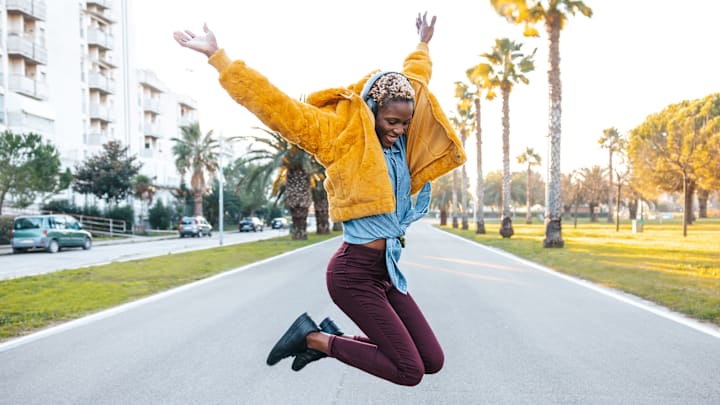The world is big. Zoom farther out, and the universe is even more expansive. Contemplating your place as one of 8 billion people on a relatively small planet can be scary. In spite of all this, you can still reclaim your own narrative from the cold indifference of the universe—all you need is a little so-called “main character energy.”
Inspired primarily by a TikTok video from Ashley Ward that went viral in 2020, the term is social media slang for approaching everything as the central protagonist. Influencers like Britta Grace Thorpe and Yasmine Sahid have championed it as a way of taking charge and living life to its fullest, and it could be as simple as dancing in public and not caring what others think to “running down the street in the city and everyone’s looking at you,” as Thorpe told The New Yorker in a recent interview.
Does “main character energy” mean narcissism? It can, sure, as the term does generally refer to someone who wants to be the center of attention in most situations. But a healthier way to think about it might be in terms of self-care: In an ever-changing world, is it really a bad thing to be right there in your own corner, cheering for yourself and affirming your own thoughts and feelings?
“When you think of movies, and you think of the main character, that’s the person that you’re following, that’s the person that you’re rooting for,” Raquel Martin, a licensed clinical psychologist, told USA Today. “I see it the same way, as like, you should be rooting for yourself, you should be the main character, like [there’s] nothing wrong with having that energy.”
Seizing life’s little moments so they work out to your advantage is what being a main character is all about. Decades after Robin Williams said to sound your barbaric yawps, the influencers of the 2020s want to dance and jog down the streets like Frances Ha, and enjoy that triumphant, “Italian memoir” feeling of buying the exact right amount of groceries. If all eyes are on them in the process, even better.
That’s not to say that giving “main character energy”—especially in the ephemera of an Instagram or TikTok post—automatically means you’re the only one on stage. According to Thorpe, you can “coexist with other people who are also having their main-character moments.”
After all, even though social media makes it possible for you to write your own story, it makes it easy for others to do the same thing. The Dead Poets were a Society, first and foremost, and there were plenty of desks to stand on. And for a world still emerging from the isolation of COVID-19 lockdowns, maybe a little mutually supportive MCE is a good thing for all of us.
Are you a logophile? Do you want to learn unusual words and old-timey slang to make conversation more interesting, or discover fascinating tidbits about the origins of everyday phrases? Then pick up our new book, The Curious Compendium of Wonderful Words: A Miscellany of Obscure Terms, Bizarre Phrases, & Surprising Etymologies! You can pre-order your copy on Amazon, Barnes & Noble, Books-A-Million, or Bookshop.org.
